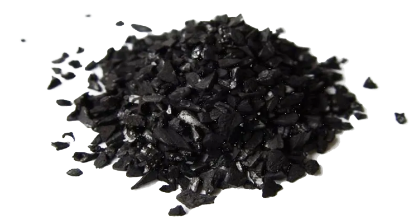
Asphalt is a bituminous material derived from petroleum, black in color, consisting mainly of asphaltenes, resins and oils, elements that provide characteristics of consistency, agglutination and ductility. It is solid or semi-solid and has cements properties at normal ambient temperatures. On heating it gradually softens to a liquid consistency. Its main constituents are hydrogen and carbon. Sulfur is usually present in amounts ranging from 1 to 6% by mass, oxygen and nitrogen are present in amounts less than 15% by mass, and metal constituents include vanadium, nickel, and iron, in concentrations ranging from parts per mill

Differences betweenasphalt and fuel oil
Fuel oil is a residual component which is mixed with medium distillates, in order to lower its viscosity, to obtain various specifications such as marine and industrial fuels. Of these fuels the most used are; IFO 180 and IFO 380 with viscosities of 180 mm2 and 380 mm2 respectively. Fuel oil differs from asphalt in that its viscosity has been modified.
Asphalt classification
The asphalts produced are used for paving roads and for industrial applications such as waterproofing, insulation, among other applications. According to their application, asphalts can be classified into two (2) main groups:
Asphalts for paving.
They are obtained by direct and progressive reduction of residues derived from distillation or by precipitation of asphaltenes using special solvents. The different grades of this type of asphalt are differentiated by the values of the penetration test. They are used for paving roads and airport runways. They are classified in:
AC 2.5: with 250 poises at 60 °C, it is considered soft asphalt cement.
Asphalt cement
They are asphalts obtained from the petroleum distillation process to eliminate volatile solvents and part of their oils. Its viscosity varies with temperature and among its components, the resins produce adhesion with the stone materials, being excellent binders, since when they are heated they liquefy, which allows them to completely cover the particles of the stone material.
Diluted asphalt (cut, reduced, or lowered)
They are liquid asphalts that are obtained by mixing a medium or low penetration asphalt (80/100) with a suitable solvent, providing the necessary fluidity in covering operations. After evaporating the solvent (completely or partially) leaving the asphalt. The period of time necessary for the asphalt to recover its original properties is called “curing time”
Fast Curing diluted asphalts (RC = Rapid Curing)
Medium Curing diluted asphalts (MC = Medium Curing)
Slow Curing diluted asphalts (SC = Slow Curing)
Emulsified asphalts
It is an emulsion made up of asphalt, water, an emulsifier, and in some cases, depending on the requirements, a certain type of additive. Asphalt emulsions can be used in a wide variety of applications, from the construction, maintenance and paving of highways and airports, to those in which the objective pursued is a covering that acts as a protective layer.
Asphalt emulsions, according to the type of surfactant used, are classified as:
- Rapid Setting Emulsions (RS)
- Polymer Modified Emulsions (Polymer Modified Grades)
- Medium Breaking Emulsions (MS)
- HF Emulsions (High Float)
- Slow Setting Emulsions (SS)